Our Academy
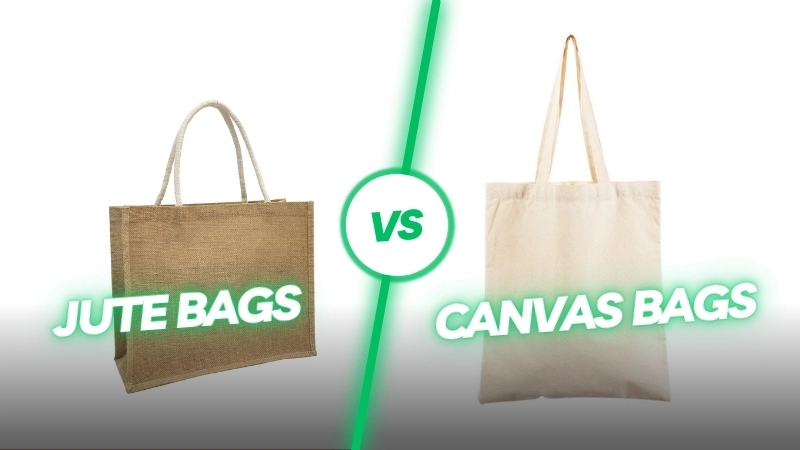
Jute bags and canvas bags are two popular choices for eco-friendly tote bags, but how do you choose the right one for your needs? This guide will break down everything you need to know about their differences in material, durability, and design possibilities.
Note: This article discusses jute bags with a PE waterproof coating. It is one of the most popular materials for jute tote bags.
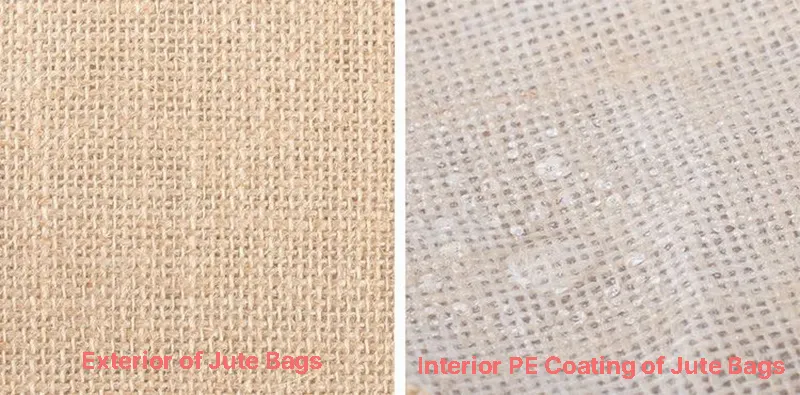
Canvas Bags: Canvas bags, in terms of material, are made from cotton, polyester, or a blend of the two. Depending on the cotton-to-polyester ratio, canvas can be further classified into three types: pure cotton canvas, poly-cotton canvas, and polyester canvas.
To learn more about the detailed characteristics and differences between pure cotton canvas, poly-cotton canvas, and polyester canvas, check out our article: Cotton Bags vs. Canvas Bags: What’s the Difference?
Jute is an eco-friendly alternative to plastic bags. True
Jute is biodegradable, and its use reduces plastic waste, making it a more sustainable option.
Jute bags cannot be dyed in custom colors due to their coarse texture. False
Jute bags can be dyed in custom colors, although minimum order quantities often apply.
Jute Bags: Made from natural jute fibers, jute bags have a coarse texture and distinctive patterns, giving them a firm and tactile feel. The unique fiber structure adds a raw, natural touch, making jute a favored choice for designs emphasizing eco-consciousness and nature-inspired styles. Its texture not only provides a rustic and distinct visual appeal but also conveys a pure appreciation for natural materials.
Canvas Bags: Canvas is smoother and softer, offering a comfortable touch for daily use. The softness of canvas makes it conform better to the user’s grip, ensuring comfort even during extended use. This combination of softness and durability makes canvas an ideal material for shopping bags and tote bags.
Jute Bags: Jute bags exude a natural and rustic aesthetic, characterized by unique fiber textures that lend a classic and vintage appeal. Due to their relatively stiff material, jute bags are more suited for simple, functional designs rather than complex, fashion-forward pieces. As such, jute tote bags with waterproof coatings are often used as accessories for styling purposes.
Canvas Bags: Canvas offers greater versatility in color and design possibilities. Its smooth surface is compatible with various printing techniques, allowing everything from simple patterns to intricate artwork to be displayed clearly. The flexibility of canvas makes it adaptable to diverse design needs, from casual styles to more creative applications. This versatility makes canvas bags practical and aesthetically pleasing options.
Jute Bags: Color options for jute bags are relatively limited, with approximately 20 stock colors available. Custom colors can be dyed based on specific requirements, but this typically involves a minimum order quantity.
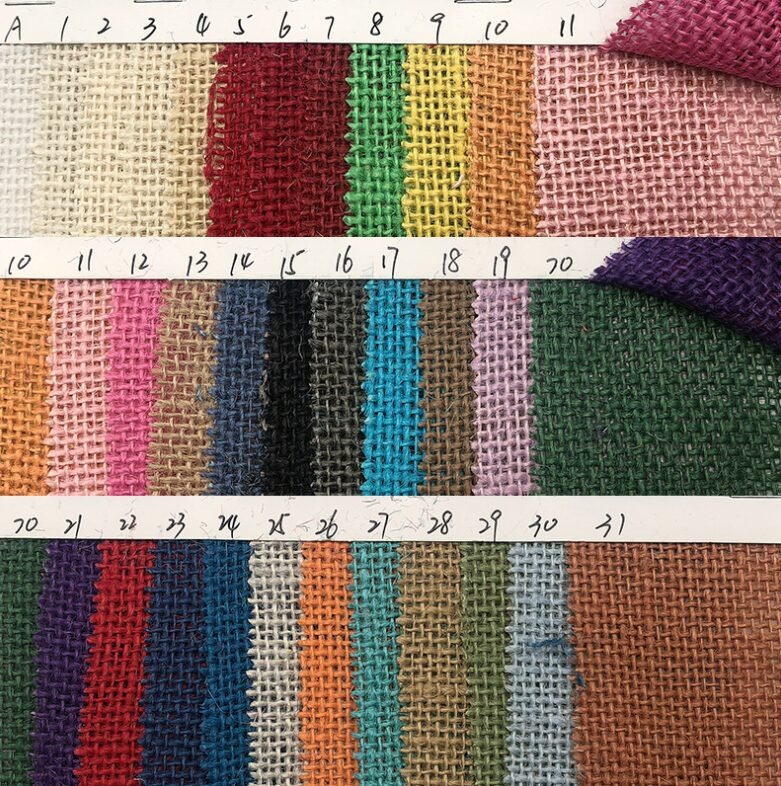

Canvas Bags: Canvas bags offer a much broader range of colors. Different weights and materials of canvas come with corresponding color charts, with dozens of shades available for each. This wide variety of colors allows for greater design and customization flexibility, meeting diverse needs from simple to complex color schemes.
Jute Bags: The durability of jute bags depends on their material and structure. While traditional jute bags have a certain degree of resilience, the fibers are relatively brittle and prone to wear and tear, especially under heavy loads or prolonged use. Jute bags with waterproof coatings significantly improve durability, providing enhanced resistance to wear and tear, better waterproof performance, and greater structural integrity.
Canvas Bags: Canvas bags are notably more durable. Made using densely woven plain or twill patterns, canvas offers superior resistance to tearing and abrasion. Heavier canvas bags, particularly those with higher ounce weights, boast impressive load-bearing capacity and can withstand heavy or frequent use. Additionally, the flexibility of canvas contributes to its long lifespan, making it ideal for high-strength and long-term applications.
Jute Bags: Jute bags are highly eco-friendly due to the renewable nature of jute fibers. Traditional jute bags are fully biodegradable, making them ideal for environmentally conscious applications. Although jute bags with waterproof coatings may lose some biodegradability, the extended lifespan of these bags reduces the need for single-use alternatives, maintaining their overall eco-friendly advantage over many synthetic materials.
Canvas Bags: The eco-friendliness of canvas bags depends on their material composition. Pure cotton canvas bags are renewable and biodegradable, similar to jute. However, poly-cotton and polyester canvas bags are less eco-friendly due to the non-biodegradable nature of polyester. That said, the durability and reusability of canvas bags reduce their overall environmental impact over time.
Canvas bags are available in a wide range of colors depending on the fabric thickness. True
Different canvas thicknesses correspond to specific color charts, offering a variety of options.
Canvas bags are inherently waterproof without any additional coating. False
Canvas bags are water-resistant to a degree but not fully waterproof without a coating.
Jute Bags: Jute’s rough texture and prominent natural fiber patterns limit its suitability for detailed and intricate printing. The uneven surface often results in less precise or uneven printing outcomes. Even with a coating that improves surface smoothness, jute bags are better suited for simple designs and less complex graphics.
Canvas Bags: Canvas, with its smooth and even surface, excels in customization and printing. It works well with a variety of printing techniques such as heat transfer, screen printing, and embroidery, delivering vibrant, clear, and refined results. Whether for intricate logos, gradient designs, or large color blocks, canvas is the superior choice for achieving high-quality branding and creative designs.
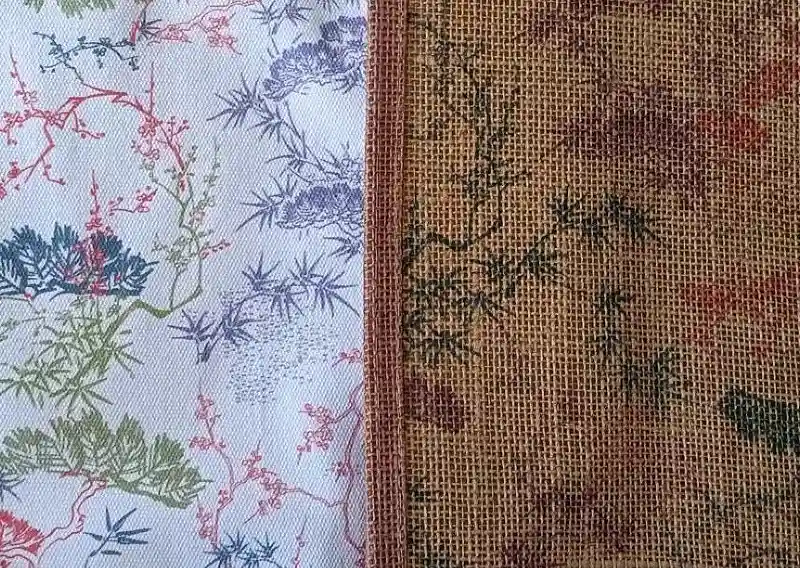
Jute Bags: Uncoated jute bags have poor waterproof capabilities as their natural fiber structure absorbs moisture easily. Adding a PE coating significantly enhances their waterproof properties, making them more durable and practical for daily use in wet conditions.
Canvas Bags: Uncoated canvas bags are slightly more waterproof than jute but can still absorb water due to their dense fiber weave. Adding a waterproof coating further boosts their resistance to liquids, making canvas bags suitable for wetter environments and extending their lifespan.
Jute Bags: Jute’s natural fiber structure and rough surface make it relatively difficult to clean. Stains easily penetrate the fibers, and excessive force during cleaning may cause damage. Uncoated jute bags may swell when exposed to water, complicating the cleaning process. Jute bags with a waterproof coating, however, are much easier to clean.
If you want to learn more about the detailed steps and tips for cleaning jute bags, click here to read our article: How to Clean Jute Bags.
Canvas Bags: Canvas is easier to clean due to its smooth surface and dense weave, which prevent dirt from deeply embedding. Uncoated canvas bags can be hand- or machine-washed, though high temperatures and vigorous agitation should be avoided to prevent shrinkage or damage. Coated canvas bags are even easier to maintain, often requiring just a damp cloth wipe.
If you want to learn more about the detailed steps and tips for cleaning jute bags, click here to read our article: How to Clean Jute Bags.
Jute Bags: The stiffness of jute makes it harder to fold neatly, and uncoated jute bags are prone to creasing or deformation. Coated jute bags are even less flexible, making them slightly more challenging to store compactly compared to canvas bags.
Canvas Bags: Canvas is softer and more flexible, especially lightweight options that can be folded into small sizes for easy storage. Even thicker canvas bags maintain their shape and can be folded without permanent creases, making them more convenient for compact storage.
Jute Bags: Coated jute bags commonly used for shopping weigh about the same as 12-ounce canvas bags, offering a sturdy and solid feel. This weight makes jute bags suitable for medium loads and everyday use.
Canvas Bags: Canvas comes in a wider range of weights, typically from 8 to 20 ounces, depending on the intended application. Adding a waterproof coating to canvas enhances its thickness and durability, making it more robust than jute bags of comparable weight. The variety in canvas weights ensures it can meet diverse needs.
PE-coated jute bags are more resistant to water compared to traditional jute bags. True
The PE coating provides a waterproof layer that prevents moisture absorption.
Jute bags are as flexible as canvas bags for storage. False
Jute bags are less flexible due to their rigid structure.
Jute Bags: Coated jute bags are moderately priced, balancing practicality and durability. Their consistent thickness keeps pricing stable, often slightly higher than lightweight canvas bags but still competitive overall.
Canvas Bags: Canvas bag prices vary depending on thickness. Thin canvas bags are usually less expensive than coated jute bags, while thicker canvas bags for heavy-duty use can be considerably more expensive. The superior durability and versatility of thicker canvas bags justify their higher price point, making them suitable for customers with larger budgets or specific needs.
| Aspect | Jute Bags | Canvas Bags |
|---|---|---|
| Material | Natural jute fibers, often with PE waterproof coating | Cotton, polyester, or blends |
| Texture | Rough and textured, with a rustic feel | Smooth and soft, versatile |
| Appearance | Rustic and natural; limited to simpler designs | Modern and flexible; supports diverse designs |
| Color Choices | Limited to about 20 stock colors, custom dyeing available | Wide range of colors; dozens available per thickness |
| Durability | Moderate durability; less resistant to wear unless coated | High durability; excellent for heavy loads |
| Eco-Friendliness | Highly eco-friendly and biodegradable | Depends on material (pure cotton is eco-friendly) |
| Printing Possibilities | Better for simple designs; less suited for intricate printing | Ideal for intricate and vibrant designs |
| Waterproof Capabilities | Requires coating for waterproofing | Better natural water resistance; waterproof when coated |
| Cleaning Ease | More difficult to clean; coated versions are easier | Easy to clean; machine washable or wipeable |
| Storage Ease | Stiffer and harder to fold or store compactly | Flexible and easy to fold for compact storage |
| Weight | Comparable to 12-ounce canvas bags | Varies from 8-ounce to 20-ounce options |
| Cost | Moderately priced; cheaper than heavy canvas | Varies; thin canvas is cheaper, heavy canvas is pricier |
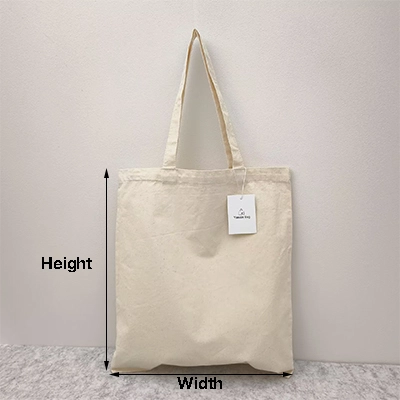
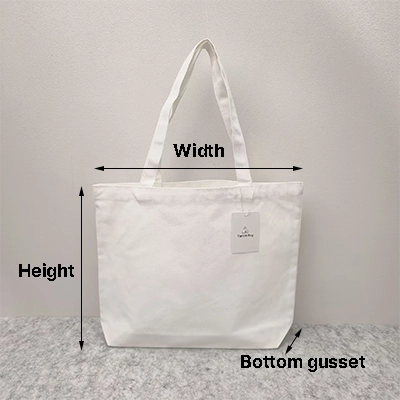
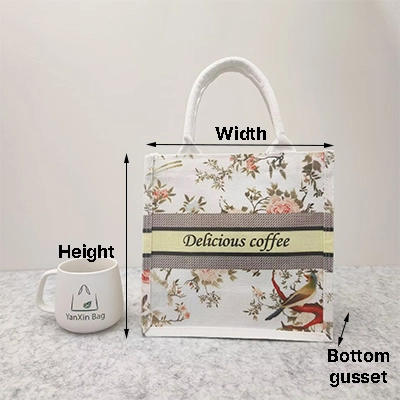
When choosing between jute bags and canvas bags, understanding their ideal use cases can help you make a more informed decision based on practicality, style, and sustainability needs. Below are common scenarios where each type of bag excels:
Jute bags and canvas bags each have their unique strengths, catering to different needs. Jute bags offer a distinct textured aesthetic and natural appeal, making them ideal for rustic and eco-conscious designs. Canvas bags, on the other hand, excel in versatility, offering smooth surfaces, lightweight designs, and diverse options in thickness and color. Whether you prefer the natural charm of jute or the practical versatility of canvas, both options provide excellent solutions tailored to your specific requirements.
Looking to choose between jute and canvas tote bags? Yanxin Bag offers custom eco-friendly solutions in both materials. Contact us for tailored designs and free samples today.
Answer: Cleaning a jute bag requires gentle care. Use a soft cloth or sponge with cold water and mild soap to spot clean the surface. Avoid soaking the bag, as jute is a natural fiber and prolonged moisture may cause it to lose shape or develop mildew. Always air dry the bag in a well-ventilated area, away from direct sunlight.
Answer: Yes, canvas bags are eco-friendly when made from natural fibers like cotton or recycled materials. They are reusable, biodegradable, and a great alternative to single-use plastic bags. Choosing canvas tote bags reduces environmental impact, especially when used regularly and properly maintained.
Answer: Jute bags typically have around 20 stock colors, whereas canvas bags offer a wider range with dozens of colors available depending on fabric thickness and material.
Answer: Jute bags are similar in weight to 12-ounce canvas bags. However, canvas bags come in a wider range of weights, from lightweight 8-ounce to heavier 20-ounce options.
Answer: Yes, both jute and canvas bags can have custom designs, but canvas bags are better suited for intricate and detailed prints due to their smooth surface.
Answer: Canvas bags have a degree of natural water resistance due to their tight weave but are not fully waterproof without a special coating.
Answer: Yes, most canvas bags can be machine-washed, but ensure there are no water-sensitive decorations or materials (like leather) on the bag. Place the bag in a laundry mesh bag and use cold water with a gentle cycle.
Answer: Turn the bag upside down and tap the bottom to shake out the sand. Use a vacuum cleaner to remove any residual sand from crevices.
Answer: The main difference is that canvas bags are made from thicker fabric, making them more durable and better for carrying heavy items, while cotton bags are lighter and more breathable, making them ideal for lighter, everyday use.
Answer: Jute bags are eco-friendly, durable, reusable, and biodegradable. They reduce plastic waste and are cost-effective, making them a great choice for sustainable living.
Answer: To keep jute bags in good condition, store them in a dry, cool place, and avoid folding them to prevent wrinkles and maintain their shape.
Answer: Jute is a natural, hypoallergenic material and is generally safe for those with sensitive skin or allergies. However, it’s always recommended to check for any personal skin reactions.
Answer: Jute bags can be repurposed for various uses, such as home decor, pet beds, gardening, or storage. Their durability and recyclability make them perfect for creative upcycling.
Answer: To extend the life of your jute bags, avoid machine washing and high heat exposure. Hand wash or spot clean them using mild detergent and air dry in a shaded area. Storing them in a dry, cool space will also prevent mold and deterioration.
Answer: Yes, jute bags come in various sizes and styles, from small gift bags to larger shopping or promotional bags. Some jute bags have additional features like side pockets, zippers, or special coatings for added durability and functionality.

Order or no-order we are Always here to help you!
We will contact you within 1 working day, please pay attention to the email with the suffix “@yanxinbag.com”.
Order or no-order we are Always here to help you!
We will contact you within 1 working day, please pay attention to the email with the suffix “@yanxinbag.com”.